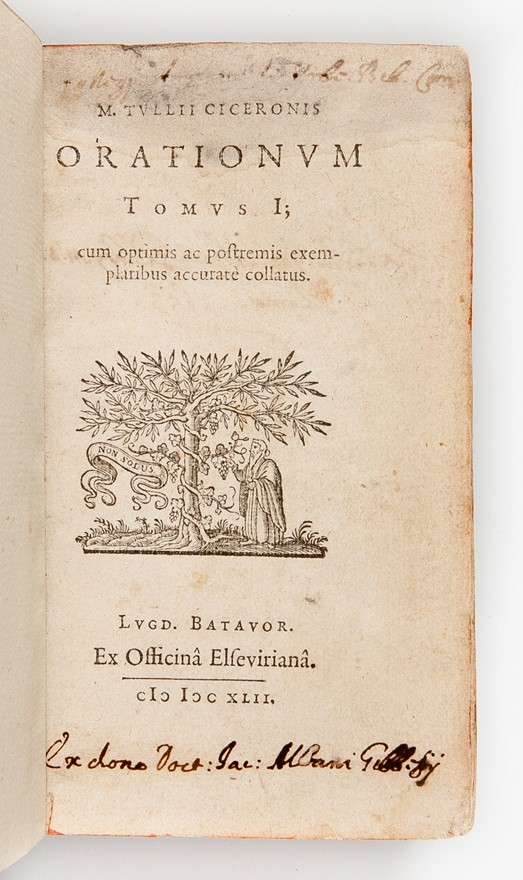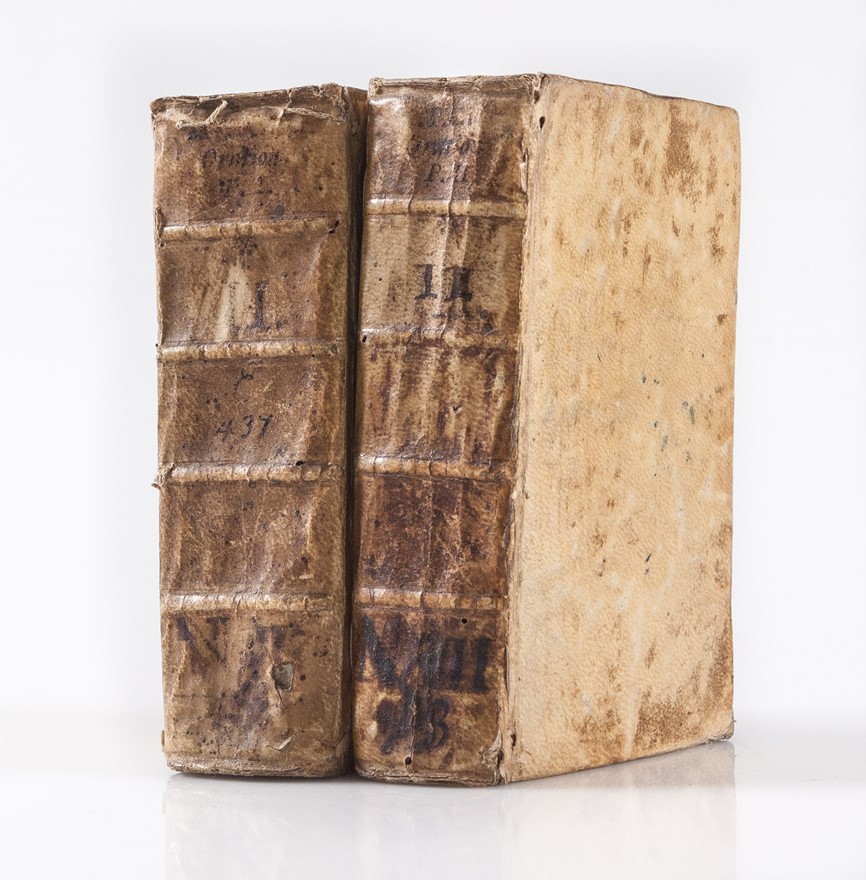Ciceronis Orationum
CICERO Marcus Tullius (1642)
£550.00
Please contact us in advance if you would like to view this book at our Curzon Street shop.
I [- II]; cum optimis ac postremis exemplaribus accurate collatus.
2 vols. 12mo. [Text: 129 x 75 mm]. 614, 550 pp. Lightly browned throughout, worm-trail through three lines from pp. 321-52 of Vol. 1. Contemporary vellum, spines lettered and numbered in ink and with various ink shelf-marks (some stains on covers and spines (new endleaves).
Leiden: Ex Officina Elseviriana, 1642.
Vols. 2 & 3 of the 10-volume Elzevier Cicero, but also sold separately and here numbered I & II.
Provenance: James Alban Ghibbes or Gibbes (1611-77), physician and neo-latin poet, with his ink inscription on the verso of the titles “Ex libris Jac: Albani Gibbesii M.D. Romae 1653” and a very few neat ink annotations in the text. Ghibbes was a physician and neo-Latin poet who was regarded in his lifetime as the “Horace of this age”. James Alban Gibbes (he later Italianised his name to Gibbesio or Ghibbesio) was born at Valognes in northern France where his parents were then living in exile. His father William, a doctor from Bristol who was later physician to Queen Henrietta Maria, married Mary Stonor, from a leading catholic family who converted him. The family returned to England in 1620 but James was sent to the English College at St. Omer to be educated and then studied medicine at Padua University (1641-44) before moving to Rome where he spent most of his life as a doctor.
“His handsome face, wonderful power of mimicry, entertaining conversation, and mastery of six living languages, coupled with his medical skill, gained him a succession of patrons, viz. Cardinal Caponi, Cardinal Spada, in whose house he resided till Spada’s death, and Prince Giustiniani, with whom [he] henceforth resided. He composed several Latin eulogies on Pope Leo X, and enjoyed the favour of his three successors. Alexander VII in 1647 gave him a professorship of rhetoric at Sapienza College worth £60 a year, as well as a canonry at San Celso; to Clement IX he dedicated two odes, and Clement X seems to have given him a retiring pension. In 1667 the Emperor Leopold I sent him the diploma of poet laureate. In 1668 there appeared in Rome four books dedicated to Clement IX his Carminum Pars Lyrica ad exemplum Q. Horatii Flacci, with the author’s portrait prefixed. The rich gold chain and medal accompanying the emperor’s diploma, Gibbes, after much deliberation and by the advice of Oxford scholars at Rome, presented to Oxford University. ... In the following February, 1670-1, Oxford, at the suggestion of the Duke of Ormonde, chancellor, conferred the degree of M.D. on Gibbes, ‘the Horace of this age’, as Wood styles him. ... In 1673 appeared a second volume of his Latin verses.” - Dictionary of National Biography.
Gibbes took a close interest in any English visitors to Rome, occasionally accompanying them on tours around the country, and in January 1645 conducted the diarist John Evelyn around his hospital. In his will he bequeathed his books to be kept as a separate collection at the English College at Rome and his manuscripts, which he was anxious should be published, to the Sapienza College [Rome University]. Common Library of the English College at Rome, with their ownership inscription “Collegij Anglor: de Urbe. Bib. Com:” at the head of both titles (partly rubbed-out in vol. 1) and “Ex dono Doct. Jac. Albani Gibbesij” at the foot (his surname damaged by iron-gall in the ink n vol. 2) and later note “Bib: Com:” on the titles of Vol. II.
See: Chaney (E.), The Evolution of the Grand Tour, chapter 10, “English Catholic Poets in mid-Seventeenth-Century Rome”.
Stock Code: 214754





